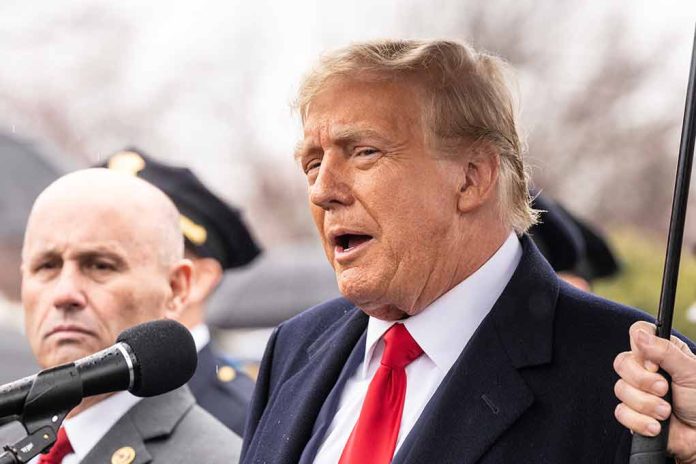
Former President Donald Trump has decided to decline intelligence briefings during his campaign, citing concerns about potential leaks and Department of Justice (DOJ) entrapment.
At a Glance
- Trump refuses intelligence briefings, fearing DOJ entrapment and leak accusations
- Decision breaks with tradition of briefing presidential nominees on national security
- Trump faces federal charges for allegedly mishandling classified documents
- Critics question Trump’s trustworthiness with sensitive information
- Experts debate implications for national security and Trump’s campaign
Trump’s Decision and Reasoning
In a surprising move, former President Donald Trump has announced his intention to refuse intelligence briefings during his presidential campaign. This decision marks a significant departure from the longstanding tradition of providing such briefings to presidential nominees, a practice dating back to the early 1950s.
Trump’s reasoning for this unconventional choice stems from his concerns about potential leaks and what he perceives as a trap set by the Department of Justice. In his own words, Trump stated, “I don’t need that briefing. They come in. They give you a briefing, and then two days later, they leak it. And then they say, ‘You leaked it.’ The only way to solve that problem is not to take it—I don’t want it.”
Legal Challenges and Trust Issues
The former president’s decision comes against the backdrop of his ongoing legal battles, particularly the charges related to mishandling classified information. These issues have significantly influenced Trump’s stance on receiving sensitive briefings.
“I don’t want them, because, number one, I know what’s happening. It’s very easy to see what’s happening,” Trump explained, adding, “We have an incompetent leader, and we have two incompetent leaders.”
Critics have questioned Trump’s trustworthiness with sensitive information, especially after the FBI’s recovery of classified documents from his Mar-a-Lago residence. This incident has strained Trump’s relationship with the U.S. intelligence community and raised concerns about his handling of national security information.
National Security Implications
The refusal of intelligence briefings by a presidential nominee is not without consequence. These briefings serve a crucial purpose in protecting national security during campaigns and ensuring candidates understand the complex landscape of global affairs.
The briefings are aimed to keep a candidate “informed enough to not say something stupid during the campaign that would upset national security issues or diplomatic issues or potentially box in a future president,” Pfeiffer said.
Experts are divided on the implications of Trump’s decision. Some argue that withholding briefings from a major party nominee could potentially harm national security, while others suggest that Trump’s unique situation warrants caution.
U.S. Secret Service Director Kimberly Cheatle expressed her support for the recently announced Blue Ribbon Panel to review our actions and the investigation of the July 13 attempted assassination of former President Trump.
Read the full statement here. pic.twitter.com/cqVTwjjFWp
— U.S. Secret Service (@SecretService) July 22, 2024
Reactions from Political Figures and Experts
The decision has elicited strong reactions from various political figures and national security experts. President Joe Biden had previously expressed reservations about Trump receiving classified briefings, stating, “I just think that there is no need for him to have the intelligence briefings.”
John Bolton, Trump’s former national security adviser, took a firm stance against providing Trump with intelligence briefings. “No prior presidential candidate has ever been under indictment for compromising classified information. That alone is reason to withhold intelligence briefings. There is no legitimate argument that denying the briefings would impair Trump’s campaign — he doesn’t understand what they would brief anyway,” Bolton said.
Despite the controversy, U.S. intelligence agencies had planned to brief Trump if he secured the Republican nomination, regardless of his legal issues. This underscores the complex balance between maintaining national security protocols and addressing the unprecedented challenges posed by Trump’s candidacy.
As the campaign progresses, the impact of Trump’s decision to forego intelligence briefings will likely remain a topic of intense debate, highlighting the ongoing tensions between national security interests and political considerations in the current American political landscape.
Sources
- Donald Trump Declines Security Briefings for This Surprising Reason
- Donald Trump reveals he doesn’t want intelligence briefings so he can’t be accused of leaking classified information
- Trump to get intelligence briefings despite classified documents criminal trial
- Biden says “no need” for Trump to still receive intel briefings
- Trump to get intelligence briefings despite classified documents criminal trial
- Trump says he’s refusing intel briefings so he won’t be accused of leaks
- Donald Trump reveals he doesn’t want intelligence briefings so he can’t be accused of leaking classified information














